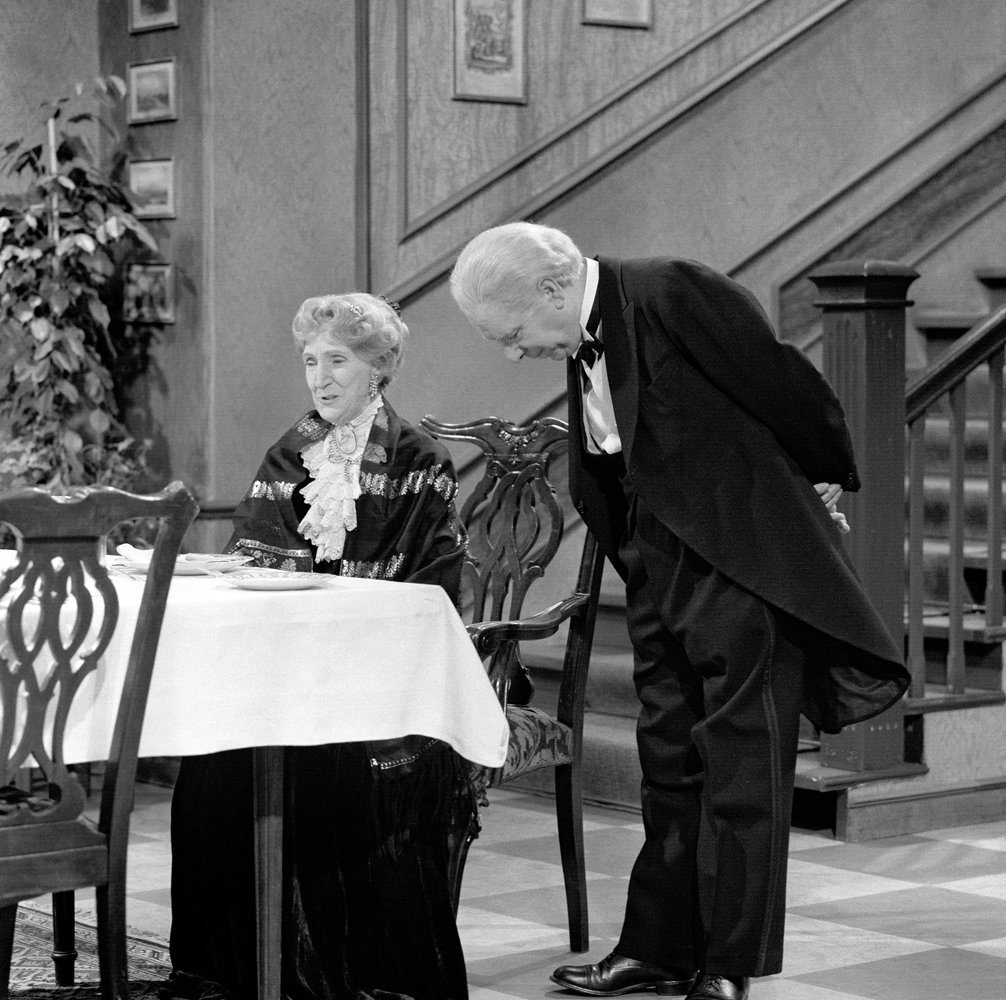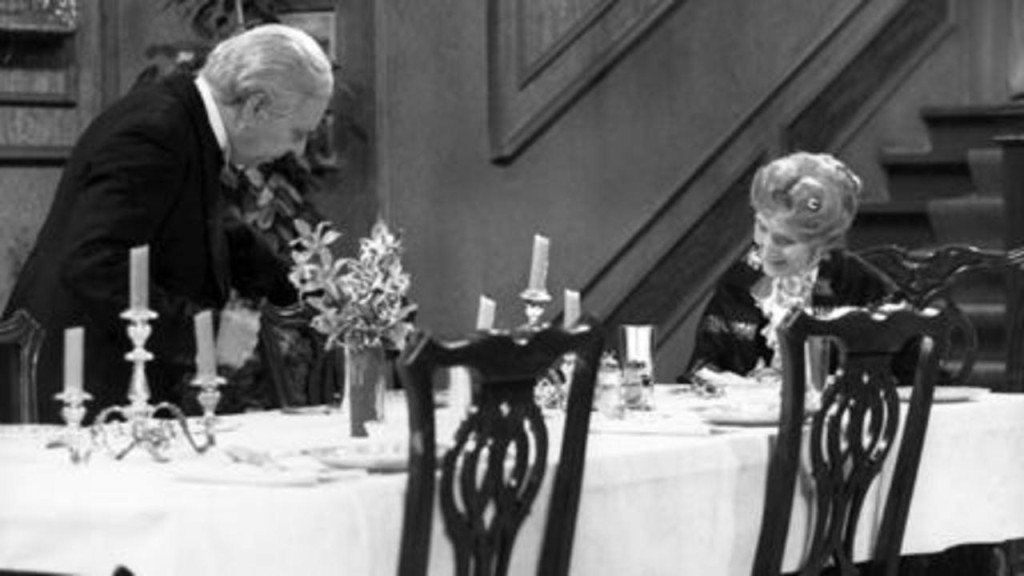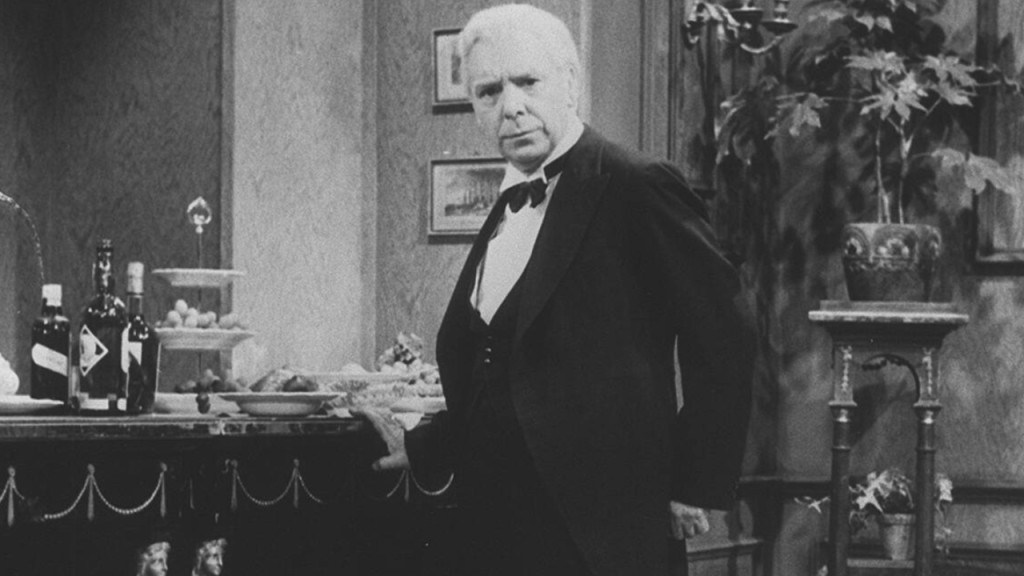Every two weeks, Stammtisch, the Meet-Up group for German speakers, gets together in various bars and restaurants all over the greater Philadelphia area. At their first meeting after New Year’s, the big topic was Lauri Wylie’s Dinner for One, the short TV adaptation of his quintessential British one-act comedy with a huge international cult following—except Britain and the US.
Despite growing up in Germany, my years of living abroad kept me away from the Dinner phenomenon. After that Stammtisch meeting, I decided to see for myself what could excite millions of people around the world—year after year.
Amuse bouche (“mouth amuser”):Setting the Table
Dinner for One takes us into the mansion of Miss Sophie, a wealthy spinster celebrating her 90th birthday with her four best friends—all of whom, unfortunately, left the party for good many decades earlier. Unperturbed, and hardly allowing this detail to slow down the festivities, it falls upon James, her aging manservant, to play the role of each guest as he serves a classy, four-course dinner, each with a corresponding drink.
Emptying every guests’ glass on each round takes its toll on James, especially as he obliges Sir Toby and his demands for more alcohol throughout the evening. By indulging Sophie’s delusion, he increasingly gets sloshed.
Appetizer: A class-conscious British dinner
Despite her own constant drinking, Miss Sophie still insists that her butler continue to follow proper etiquette, even going so far as to demand that he salute Admiral von Schneider by clicking his heels and shouting “Skål!” [Swedish for “cheers”] whenever the Admiral receives another drink.
As the evening progresses, Miss Sophie maintains her control and composure, in spite of all the drinks, while James loses command of his physical self and his use of language. He wants to do his best but fails miserably.
The constant emphasis on procedure and pomp, allows this British farce to go beyond costume drama as it shows James, a member of the working-class among the rich and powerful, forced to serve even invisible members of the aristocracy—leading to hilarious scenes, especially at the end when the lady of the house unexpectedly blurs their strict class divisions.
Entrée: The scoop on the playwright and the actors
Playwright
Born into a theater family and cutting his teeth on stage in the 1890s, Lauri Wylie (1880-1951) penned Dinner for One, also known as The 90th Birthday, during the 1920s. It opened in London’s West End in 1948, and made it to Broadway in 1953. Prior to his success with Dinner, he co-wrote revues and operettas, some with his brother. These include a parody of Gilbert and Sullivan, the reigning kings of popular operettas. He also co-wrote the libretto for Princess Charming, which was filmed and screened in the United States under the title Alexandra.
Actors: Freddie Frinton and May Warden
Freddie Frinton (1909-1968) was an English comedian who performed in music halls and, later, on television. Born Frederick Bittiner Coo, an illegitimate child, he was raised by foster parents. He began his comedy career in a fish processing plant. Apparently, he spent too much time there entertaining the workers with parodies and jokes. As a result, he was fired—his comedic baptism by fire. After some modest success in the theater world, he renamed himself Freddie Frinton.
Frinton served as a British troop adviser during World War II and refused to do the sketch in German. However, he agreed to perform it in Germany, not realizing that the televised program would make him an international star.
May Warden (1891-1978) was an English actress and comedian. She became Frinton’s partner in crime as the Dinner’sancient Miss Sophie—a role that, together with Frinton, made her well-known around the world. Apart from non-speaking roles in Stanley Kubrick’s A Clockwork Orange and the Doctor Who serial The Daleks’ Master Plan, she also played Billy’s vocal grandmother in the TV series Billy Liar.
British palette cleanser: A German discovery
Thanks to an off-chance visit to a performance of Dinner for One in 1962, starring Frinton and Warden in Blackpool, German entertainer Peter Frankenfeld and director Heinz Dunkhase immediately saw the potential of this play for their audience back home.
A year later, Norddeutscher Rundfunk (North German Radio and TV, or NDR) recorded the sketch in front of a live studio audience at Theater am Besenbinderhof in Frankfurt a.M. on July 8, 1963. They filmed the single-take black-and-white recording with Warden and Frinton in 18 minutes.
Although most films in Continental Europe are dubbed into the vernacular, this sketch is shown in the original English without dubbing or subtitles, because it contains just a few lines that are easy to understand, especially as the film leans on a lot of physical humor. As a result, Dinner for One has the distinction of being one of the few German television shows unsynchronized in English.
Dinner was shown on television occasionally, but attracted such a large following that it became a permanent feature, starting on New Year’s Eve 1972. From there, it entered the Guinness Book of World Records as “the most frequently repeated TV program ever.” NDR added a colorized version in 1999, and some countries will even replay it during Mardi Gras or Carnival.
In addition, the original Dinner has been rehashed in thousands of parodies, often using local dialects, including a Norwegian punk version. Even politicians were not spared, for example, in a satire featuring former French president Nicolas Sarkozy serving German Chancellor Angela Merkel. With a twinkle, she acknowledged that satire in her 2012 New Year’s address.
In 2016, Netflix treated its audience to an unusual Dinner, with a parody featuring characters and actors from American shows, including Better Call Saul, House of Cards, Narcos, and Orange is the New Black.
The crucial exchange between the only living members of the party—the old dame and her ever so faithful servant—has become almost iconic, so much so that people all over Europe repeat it as a joke:
James: The same procedure as last year, Miss Sophie?
Miss Sophie: The same procedure as every year, James!
This dialogue reminds me of the many surreal plays of Philadelphia’s Idiopathic Ridiculopathy Consortium (IRC), based on this part of their mission statement: “We bring good nothingness to life.” I wonder if IRC’s director, Tina Brock, would be willing to perform Dinner for One as an annual New Year’s event— at a theater where we drink more champagne than is good for us.
 Digestif: Asking some tough questions
Digestif: Asking some tough questions
Although Dinner is broadcast regularly on New Year’s Eve all over Europe–including Germany, Austria, Switzerland, Scandinavia, the Netherlands, even Estonia, as well as Australia and South Africa–hardly anyone in Britain, the US, or Canada has seen this short film. The result has been an occasional comedy of errors when German tourists quote the punchlines to unsuspecting Brits, only to have the latter wonder what in the world these Continentals are talking about.
After watching the famous movie, one lingering question hit my brain: why didthis film never take off in England or the States the same way it had elsewhere? Although its absurdist humor and physical comedy seem tailor-made for the Monty Python set, Dinner for One has spent much of its life as an obscure oddball among most native English speakers.
Theories as to why stem from its runtime (at 18 minutes, it’s a poor fit for the US television format) to the usual excuse of copyright distribution. Another reason could be this confession from an American friend, “We are cultural philistines and often don’t like anything that is not American.”
However, things may change. Take the popular Monty Python series, a famously British troupe that nevertheless filmed at least one season for German television—unavailable to U.K. and U.S. audiences until many years later. Maybe it will simply take time before audiences in North America will find it amusing to watch the antics of a British odd couple on an annual basis.
A mint or a toothpick: What do you think?
The movie certainly deserves wider recognition. Luckily, the advent of the Internet has made finding these lost gems far easier than ever before. Now may be the perfect time for Dinner to finally cross the Atlantic.
However, given the vagaries of public taste, we may have to poke around in the Anglo American psyche a bit to find out what’s holding back US support for one of the most popular New Year’s events, almost as famous as AuldLang Syne.
So, treat yourself to a classic Dinner for One and discover what the rest of the world has already found.



I first heard of this play in Germany in 1980 and have loved it. It is a true German ritual to watch it on New Year’s Eve.
Thank you for your interesting response to DINNER FOR ONE, “a true German ritual to watch it on New Year’s Eve,” as you put it so vividly. Alas, having lived abroad for many decades, I never heard about the most widely repeated TV film worldwide.according to the Guinness Book of World Records.
Good news, according to the literature available on this phenomenon, DINNER FOR ONE is also shown during Mardi Gras or Carnival (Karneval in German) in quite a few countries around the globe, except the US, Canada, and the UK. Who knows, it might eventually catch on here as well.
Bring in Tina Brock of the IRC, Philadelphia’s popular surreal theater, and it might catch on taking Philadelphia by storm. 🙂
Henrik Eger
My first time seeing this extremely polished bit of comedy. It’s funny, but also a master-class in how to mine a situation for unexpected laughs.
John, thank you for your fascinating comment. Before I finished my article, I searched the Internet in both English and German and couldn’t find any reason why this brilliant masterpiece has not become a cult movie the way it is in Europe and many other parts of the world where people watch it every New Year’s Eve–often with numerous shows, including spoofs, for example, version in the local dialect or a working class version, etc.
In addition, I interviewed countless people in the US and, in the end, had to come up with my own interpretations. If you can think of any reasons, other than the ones that I presented, please let me know and I’d be happy to update my article.
However, I am grateful that countless people in the US are reading “Dinner for One: The greatest cult film you’ve never heard of,” so much so that is has become one of the most widely read articles on Phindie one of my favorite theater and arts portal.
I would like nothing more than small theaters all over the English-speaking world who would perform it during those festive post-Christmas and Hanukkah days, perhaps combined with another, perhaps a modern satire (Beckett has been suggested), serving champagne, and making it a fun fundraiser for small theaters from, say, Dec. 26 to early January. What do you think?
It is really sweet that Germans and others have adopted something and that this sketch is special for them. I respect that and don’t doubt for a second the genuine love and admiration some have for Dinner for One. But I am really surprised to see Monty Python compared with Dinner for One. I have to say it was painful to sit through. Painfully, painfully bad and unfunny. That’s why it has never caught on in Britain. I suppose we must have a very different sense of humour to that of Scandinavia and the German-speaking countries. We don’t consider it funny if someone falls over something. There’s nothing subtle or clever or nuanced about it (Rowan Atkinson’s absurdist physical comedy went down so well due to its complexity, think of the sketch where Mr. Bean makes the sandwich on the park bench and it gets progressively more and more absurd, he gets the fish out of water and slaps it against the bench to kill it before eating it, etc.). It’s not funny the first time the butler falls over the tiger-skin rug and it gets progressively more and more irritating each time he does it. You can spot the punchline a mile off and so the end of the sketch falls very flat. It’s nothing whatever to do with the length of the sketch or its obscurity or difficulty finding it: people still seek out all the comic greats on Youtube.
Again, no offence meant, if you love the sketch and want others to see it, that is a very nice sentiment but if you find British people, and show them the sketch and ask their opinions, you will find no one laughs and complements will be far from forthcoming at the end. Still, it is fascinating, is it not, how humour translates differently across cultures?
I must admit that I am one of these odd scandinavians who love Dinner for one. But perhaps I can explain to you what it is that we find so appealing in that short comedy act.
Actually, it has a lot to do with being British and your well known self irony and ability to make jokes about your own personal little mistakes in everyday life. And Frinton is making a hugely understated virtue out of that part of British humor. But he is also allowing us to recognize ourselves in this understatement, by showing us how some mistakes are repeated time and again.
To draw a comparison. My sister lives in a cosy little cottage where there is a step down from the dining section to the living room. When she moved in, it was a regular feature for both of us (many times each day for the first week, and then gradually becoming less frequent) to stumple on that step and having to fight to keep from fallling. On occasion, especially if we are drunk during festive times or are overly active and in too much of a hurry, we still stumple on that step. The butlers eternal battle against the tiger head is a constant reminder of that to me and my sister, which makes it even more amusing to us.
I could draw similar comparisons to other things that he does in the same vein. But the point is that he is not sitting down and making the jokes about that side of peoples personal life. He is actually showing us how we tend to “stumple” on many sorts of little mistakes when events call for us to forget for a moment that we have been there before. And that is what makes this act so spot on. He is showing us humans as what we are. human beings who are far from perfect, and at times quite comic creatures with or without intent.
He is also showing us how intricate relationships can be. Through most of the act, he is merely the unfortunate manservant. It is only in the end that we are allowed to discover that the real relationship between the manservant and the upper class lady has a lot more to it than meats the eye at first glance.
A short comparison again. This can be seen in my own life as well. I am a lorry driver. As such, I am on the payroll of my boss. But I am also an active duty NCO (petty officer) in the Danish home guard. My boss is actually one of my privates. So we have a lot of joking and bantering about me being the boss when we are at civilian work, and vice versa.And it has become a feature at both work and the home guard duty which the other workers/servicemen laugh about and even take part in.
And this is prpably the difference between British and continental humor. You will mostly make jokes about it verbally, where continentals love to see it acted out in front of our eyes. The point is the same in both cases, but the methods of joking is differrent.
There’s definately a lot to find out about this issue.
I love all the points you’ve made.
I’d like to find out more? I’d want to find out more details.
Thanks for this fascinating background of a performance my family relishes.
Tonight we happened to watch _The Party_ (1968) and noticed that the hilarious, understated performance of Steve Franken as an increasingly inebriated waiter seemed to owe a lot to Freddie Frinton. There’s also a tiger rug on screen for an instant.
https://web.archive.org/web/20090409235512/http://www.palisadespost.com/content/index.cfm?Story_ID=4048
Maybe the Brits don’t like the sketch because for more than 100 years they hate everything that comes from Germany. Weird enough, because this sketch ist utterly english: The actors are english, the lines are english, the original author is english. And the Americans are just ignorant or as it has been written before: They don’t like anything that is not american.